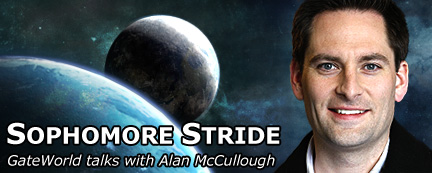
Beware of SPOILERS for Seasons Four and Five of Stargate Atlantis in the following interview!
He’s been working on and off with Stargate since the ninth season of SG-1. Now, in his second year as a full-time staff member, co-producer and writer Alan McCullough catches up with GateWorld for what is not turning out to be a sophomore slump, but the opposite!
McCullough has written several SG-1 episodes including “Prototype,” “Stronghold” and “Insiders.” Last season of Atlantis he was responsible for “Tabula Rasa” and “The Seer,” among others. Now in Season Five, he tells GateWorld about his latest scripts and some of the others he is seeing come down the pike.
Our interview with Alan runs 20 minutes. You may listen at your leisure, download to your MP3 player, or read the transcript below!
GateWorld: For GateWorld.net, I’m David Read, and I’m here with Mr. Alan McCullough, writer for Stargate Atlantis.
Alan McCullough: Hello! Yes, yes.
GW: Thank you for letting us in[to your office], sir.
AM: Thank you! Thank you for coming.
GW: We’re just a few weeks starting into production of Season Five. Any early thoughts?
AM: It’s great! We’ve got a whole new batch of stories. It always amazes me that we can come up with new material after so many seasons of Stargate SG-1 and then Stargate Atlantis. There’s some really exciting stories coming up.

Season Four introduced new characters, and challenges for old ones.
We had a really strong season in Season Four. Season Four was my first season so I was thinking, “Oh, maybe sophomore slump.” And it was also Joe [Mallozzi] and Paul’s [Mullie] first season as show runners. I had some concerns at the beginning that we were going to get into a sophomore slump. But the cuts we’ve seen so far are fantastic.
The two-parter, the first part of the two-parter that Martin [Gero] just wrote this week is amazing. It’s going to be an incredible teaser for the second part. There’s some great stories in between as well. We’re wrapping up some storylines and opening up new ones.
GW: What do you think fans are going to most be excited about this year? What are you most excited about?
AM: There’s a lot. I always love the Wraith stories. I think we started to explore, a little more, the character of Todd in Season Four, and I think that opens up a lot of possibilities with the Wraith.
I think now that the Wraith have been beaten back a bit by the Replicator war in Season Four, I think it opens up some new possibilities for interactions with the Wraith that maybe we couldn’t do in the past because everything was always so immediately aggressive or antagonistic, whereas now we’re starting to cooperate with the Wraith, try some things out. That’s cool. There’s some cool stories coming up in that respect.
The season opener is great, I think. Coming up from what Paul set up in “[The] Last Man,” what had been set up at the end of “[The] Kindred, [Part] 2.” Teyla’s missing and all that. So all that gets wrapped up. There’s some really heart-warming moments in that.
What else do we have … We have a couple one-offs, one of which I wrote, “The Daedalus Variations,” which is a great team show and it’s a real visual effects spectacular, too. We haven’t seen any of those yet but it’s going to be an amazing visual effects show that I think is very exciting.
GW: What’s the idea of that story?
AM: The idea of that story is the Daedalus just shows up in orbit, unexpectedly, and it doesn’t make sense because we know for a fact it should be back on Earth. When we try to radio we receive no response, and when we scan it we learn there’s no life signs on board.
We head up to investigate and very quickly find ourselves in trouble because there’s a strange energy reading coming from somewhere in the ship. We can’t figure it out. We don’t know where it’s coming from. Suddenly it spikes, a flash consumes the ship, and a moment later when it dissipates we learn that Atlantis is gone, and we have shifted realities.
We’re essentially on a Flying Dutchman. This drive is caught on autopilot and every time it charges, it bursts, and we jump reality after reality after reality after reality. So they get trapped on a ship. There’s no way home, essentially. [They] have to figure it out.
It was a neat opportunity to see a bunch of different alternate realities.
GW: You can tell some stories.
AM: Yeah, because we don’t have to build a new set every time. We’re still on the Daedalus, but you get to see through the visual effects what might have happened in this reality, or what might have happened in this reality.
GW: Do things change aboard the Daedalus as well?
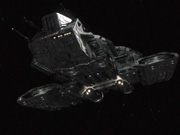
An alternate-reality Daedalus pays a visit to our universe in “The Daedalus Variations.”
AM: Just outside of the Daedalus for the most part, although there is one important interaction that takes place on the Daedalus. When we jump to another reality we get boarded. I won’t say more than that. We do end up having to win back our Daedalus from an alien species.
GW: Is this just a wind romp or is there lasting impact?
AM: Not really. It’s pretty much just a wild romp. It’s pretty much just a one-off adventure story that gets the team into trouble and gets them out at the end. But yeah, it’s a lot of fun. It’s a fun script.
GW: Mitch Pileggi is in some of those realities?
AM: No, actually. The crew of the Daedalus is completely missing. In fact, it’s an alternate reality Daedalus. It came from dozens of realities ago. We see video of a captain and the former colonel who is in charge of the Daedalus, and it’s not Mitch.
GW: That’s a good excuse.
AM: Hey, we’d love to use Mitch whenever we can, but when you’re going to shoot just a lock-off of a final log entry we’re wasting his talents on something like that.
GW: The Wraith stories, and Teyla’s story in particular, are growing this year. What directions are you most excited about for these characters?
AM: Falling on some stuff we culled from Michael’s research, we make a proposition to Todd later in the year. The episode I’m just finishing right now, it’s called “The Queen. We set up the episode. We go to Todd with a gene therapy we’ve managed to develop using Michael’s research, which we believe will make the Wraith able to process food and thus not have to feed on humans anymore.
GW: Like Michael did.
AM: Like Michael did! Exactly. So this is something that obviously would be very valuable to us and we’re trying to pitch Todd on it to help us develop it further and test it. Of course, Todd, who’s always got his own agenda, asks us to do something in return, which is what then the episode becomes about.
It becomes a very Teyla-focused story. Essentially what Todd requires is he’s joined an alliance of other hives, but the only way you can be — he’s had to fake his way in and lie and say that he had a queen on board.
GW: [Laughter] Oh no …
AM: I don’t want to say more. Perhaps I’ve already said too much. But it goes in an interesting direction after that.
GW: What a twist! That’s awesome.
AM: It’s a combination of a story that I pitched and a story that Alex Levine, our story coordinator, pitched last year. He pitched a story where there was a Wraith summit and we tried to infiltrate it. We were trying to infiltrate a Wraith summit and we needed to go in undercover. Using that pitch, as well as some story elements that I pitched this year, we built the story.
GW: Teyla’s already a little bit Wraith.
AM: Exactly. It helps that she has some Wraith DNA already. So yeah, as far as major arcs of the season go, we’re always developing the characters in some ways. There isn’t a major season-long arc this year the way there was last year with Teyla and the missing Athosians, and her pregnancy, going missing at the end of the year. But there are changes happening in the galaxy.
It’s the aftermath of the Wraith/Replicator war. The Wraith have been beaten back. Some of the societies in the galaxy are getting a little stronger, rising up, getting a little more confidence, they’re seeing an opportunity that they didn’t see when the Wraith were ever-present.
There’s subtle arc things happening in Season Five. And who knows? Maybe we’ll come up with something in the back half of Season Five that tears it wide open. You never know when that happens. Someone will come in and pitch an idea and it’ll, all of a sudden, spin things off in a completely different direction.
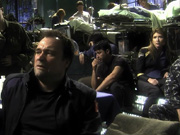
Manyu primary characters took on a secondary role in “Tabula Rasa.”
GW: Which of your stories from last year are you most proud of? Which did you not think didn’t work out as well as you wanted?
AM: To be honest I had a pretty good year last year. I think the stories that I wrote, on the screen the way they turned out was great. I was particularly proud of “Tabula Rasa.” I can’t take credit for the way it was shot.
It was a difficult script to write. Two different timelines progressing at the same time, and making sure you weren’t creating an illogical chronological problem. But then when it went into production Martin Wood came up with the idea to shoot them and have the different looks — one for the past and one for the present.
I loved the way that turned out. I think it looked amazing. It’s something we don’t get to do that often. That was a very successful episode. Plus it’s just classic sci-fi. The tease where McKay’s lost his memory and he’s tied to a chair. There’s a cryptic message from Teyla, whom he’s supposed to recognize but doesn’t.
It’s just a classic conundrum. I loved the way that played out in the episode. And the chance to see some of our lead characters not in leading roles, at least at first. We go into the cafeteria where they’re keeping everybody, and Carter is there but she’s in the distant background. People are stepping forward and saying “Well, I think we should do this.” And no one knows who you’re supposed to be listening to. I just love that anarchy we tried to play with a little bit.
So I was proud of that one, but that’s not to say the others … I really liked how “Spoils of War” turned out. We knew we were bringing Beckett back at the end of the year, and we knew we were going to do it by cloning him — that he was a clone. But we’d never said the Wraith had any kind of cloning technology. So it made sense to us that we had to somehow seed the existence of cloning technology among the Wraith far in advance of Beckett’s return.
So I came up with a story where A, we accomplish that. We seeded the fact that they have cloning technology. But also it was cool, I thought, [the] way that they managed to defeat the ancients ten thousand years ago. I personally love bringing in storylines that illuminate aspects of the past.
GW: It’s pay-off!
AM: Yeah! Exactly It rewards loyalty for the fans. I just love to play with things. Maybe it’s not all about the past, but at least you’re taking a little bit about how a certain character ended up this way, or how a certain society developed, or how the Ancients developed certain technologies. I loved doing that story.
GW: One of the things I was really interested about “Spoils of War” in particular was you guys have enjoyed using the same actors for the different Wraith parts. This gives an explanation as to why.
AM: Right! Yeah, exactly. That decision was made far in advance of introducing cloning technology. It’s nice how it all works. Now “Oh, I see. They may have only five, or 25, different Wraith templates, and they reuse them.”
GW: Are you enjoying writing for Robert Picardo this year?
AM: Yeah! Unfortunately I have not had a chance … I got to write him a little bit last year in “The Seer,” which incidentally was another good episode, although I can’t take credit for that one. The story changed so much by the time that went into production that Paul had to do a very substantial rewrite on that one. I do like the episode but I can’t take full credit.
I haven’t had the chance to write for Robert Picardo because he hasn’t been in any of my episodes. We have him for 14 episodes this year. We have to use him judiciously. In an episode where the team is trapped on a ship jumping in alternate realities, there’s no good reason to cut back to Atlantis. So we have to use his talents, again, judiciously. Just like we do with Mitch — with Caldwell.
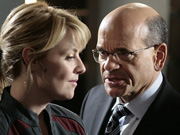
McCullough mourns the loss of Tapping, but is excited to write for Picardo.
It’s funny, in “The Queen,” the one I’m writing right now, he wasn’t in it in the first draft and we’re talking about possibly using him for a scene in the second draft, but again it’s just a scene, and we’re hoping maybe we can figure out a way to do it in a believable fashion where we can be on the base but not have Woolsey sitting in on the discussion.
It’s a bit of a challenge sometimes to keep him out of a story but I would love to write a big Woolsey story. Joe’s working on one for the back half, no details on that yet, but it’s something he’s working on which will feature him heavily. That will be great because he’s such a great actor. He’s really a great actor. He’s brought such comic genius moments to a lot of scripts like “The Seer.”
I know Carl’s working on a story this year called “Ghost in the Machine.” There’s just some great comic bits for Woolsey. Actually in Joe’s script, “Broken Ties,” it has some great comic moments for Woolsey as well. It was sad to lose Amanda, obviously, but boy, if you had to find a replacement there’s no one better for Robert Picardo.
GW: And how telling that was, in the last episode. That wasn’t even planned yet and then here he is. Here’s a glimpse at the future
AM: Oh I know! Exactly. It’s amazing how these things work out. We get a lot of credit for having set things up years in advance. Often times we back-sell. We do make it correspond, or concord, with the past. “How do we manipulate this so it looks like we set it up three years ago?”
GW: So often it just falls into place.
The Hoffan drug in “The Kindred” is a great example of that. Do you guys go back into past years, like three, four, five or more years, into the mythology and look for pieces you can use in that way or is it just a happy coincidence that it worked for the story?
AM: We definitely do that. We mine the past for stories. There’s another Hoffan story coming up. I’m going to be working on it next. We definitely mine the past for stories. And it’s a great place to get stories. There’s so much information that comes out in an episode that most of the time there are things left unanswered.
“What would happen if the Hoffan drug was spread on a wide scale? Who would benefit from that?” I think it was Joe, originally, [who] pitched out that it could be the Hoffan drug. I think when we originally designed the story, “Well there’s a plague afflicting the galaxy.” Then we think about it out a little more and talk about it a little more. Somebody suggests, “Well maybe it’s not a plague. Maybe it’s the Hoffan drug.”
It’s good to have a seasoned team of people to be working with who do have encyclopedic memories. All these guys have encyclopedic memories who can draw things from the past, and characters. “What about Janus’s lab? What about the Hoffan drug?”
GW: Is that an extra challenge for you as a writer who’s just in your second year?
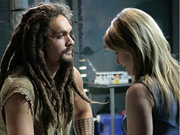
Alan hints at a potential love triangle between Dex, Keller and McKay in Season Five.
AM: Yes. It’s always a challenge to keep up with stuff. I wrote on SG-1, obviously, for Season Nine and Ten and watched every single episode. When I first started on the show I hadn’t watched that many episodes. Although to write “Prototype,” I got a FedEx with twenty episodes in it, and they were all saying “Just watch these so you can get the background for Prototype.” My God.
Once I was hired on as a staff writer I worked my way through SG-1 and subsequently through Atlantis as well. So you do lose little things. You lose little details, but the bulk of the stuff is all in there somewhere.
GW: What character moments, or moments between characters, would you like to write this year? What’s spinning in the back of your noggin?
AM: Well, first of all I’m happy to be writing a Teyla story. I like the fact that, particularly in Season Four and to some degree in Season Five we’ve started to open her up as a character and focus on her a little more. So I do like writing Teyla stories. I’m looking forward to writing the next story I’m working on after this because it involves Beckett, who is a favorite of mine as well.
Character interactions between each other … I don’t know if we’ve planned that far ahead. There is a nice thing going on, which I haven’t really had to deal with or had a chance to write for yet, which is we’re setting up a bit of a love triangle. There’s a possibility of a love triangle.
Last year we saw Dr. Keller get in a near kiss with Ronon, and towards the end of the season in “Trio” and following up in “[The] Last Man,” we see a version of an alternate future where she and McKay get together. We thought it would be fun to …
GW: … experiment on that.
AM: Yeah. Let’s see where that takes us. Let’s put these characters in a situation, in an ongoing situation throughout several episodes, and see where it takes us.
To be honest we don’t know how we’re going to resolve it yet. We’re playing around at the moment. Carl’s written a great episode this year which delves into that relationship in a little more detail, that triangle. And then I don’t know. We’ll see. I don’t know what we’re going to do with it to be honest. We haven’t decided.

